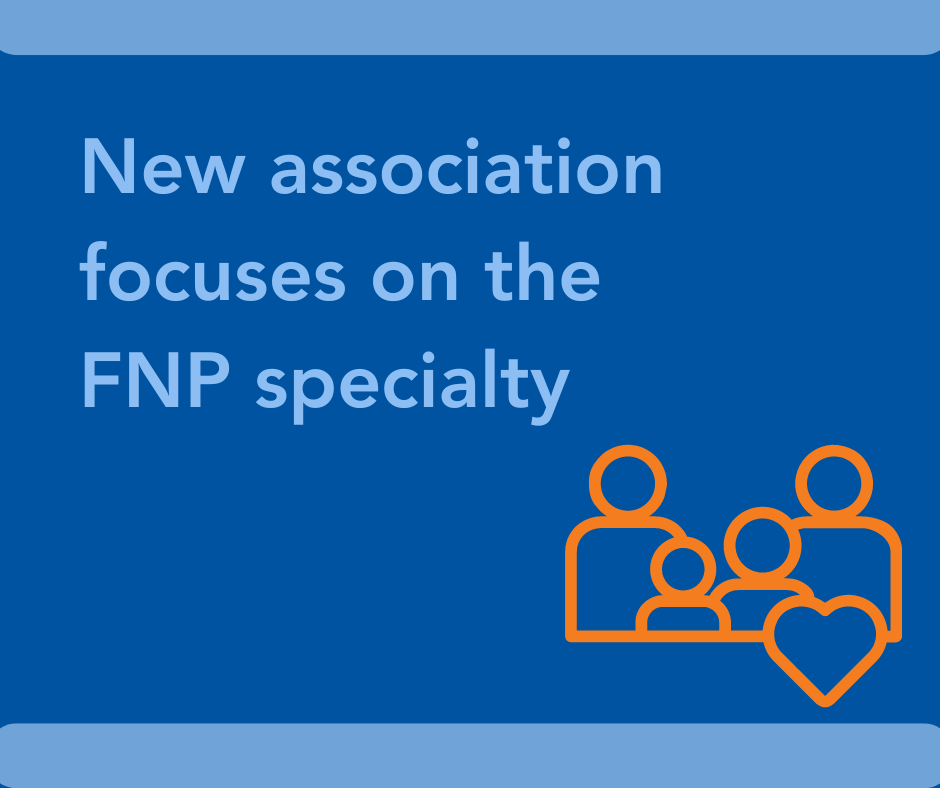The largest NP specialty has a new home for advocacy, education, and more
Share:

For the first time, family nurse practitioners (FNPs) have a membership organization devoted to their specialty. The National Association of Family Nurse Practitioners (NAFNP) grew from the recognition that FNPs have distinct interests that will be well served by a specialty organization that complements established resources such as the American Association of Nurse Practitioners (AANP) and the National Organization of Nurse Practitioner Faculties (NONPF).
“This is an organization that's focusing specifically on the needs of the FNP from both an educational standpoint and a practice standpoint,” said Bridget O’Brien, DNP, APRN, FNP-BC, AOCNP, the president of NAFNP. Dr. O’Brien is the Director of the FNP program at Rush University, where she is an assistant professor in the Department of Community, Systems and Mental Health Nursing.
She emphasized that NAFNP will work alongside other national organizations representing NPs. “We fully intend to work directly with AANP and NONPF. In fact, we encourage our new members to be part of both organizations.”
The genesis of NAFNP was a NONPF special interest group (SIG) for program directors, whose members noticed a particular topic of discussion recurring among them: the lack of a dedicated organization for FNPs. SIG members recognized the importance of the family practice role being visible and represented when policies are determined and education standards are developed.
“Without some representative body for the population, I think it’s easy to kind of get missed or overlooked in terms of having a say in things that are going to be directly related to our role,” Dr. O’Brien said.
NAFNP will focus on advocacy, education, mentorship, and practice support. “We see NAFNP as an opportunity for the nurturing of FNP leaders for this generation and successive generations,” said Shaun Fagan, the executive director for the association.
After laying the groundwork for the association in 2022 and 2023, NAFNP began marketing to potential members in late 2023. As of March 2024, 75 FNPs have joined. The founding members quickly became active participants, volunteering for committees focused on education, mentorship, advocacy, and scholarship.
“Our members are passionate, and they want to be engaged,” said Fagan, who meets personally with each new member to understand their interests. “They see this as an opportunity to get involved and get hands on in the types of issues they care about, whether it's starting a journal or working on practice advocacy or helping shape policy that affects the nurse practitioner profession.”
The mission for the new association reflects the principles that led to its founding: ensuring that the family nurse practitioner role is supported and continues to thrive. NAFNP has identified commitments to:
- advocate for FNPs, including full scope of practice nationwide
- provide clarity and consistency for FNP education
- provide guidance and mentoring for new graduate FNPs
- enhance practice support for experienced FNPs
- strengthen leadership opportunities for FNPs
- establish networking among FNPs nationwide
- establish standards for educational programs
- represent FNPs in development of practice-based guidelines and educational standards
- support continuing education and training
- amplify FNP scholarship
- provide resources for international FNP program development.
Membership in NAFNP is available at six levels: Founders Club, charter, associate, retiree, activity duty military, and student. Dr. O’Brien said she has recommended professional memberships to students for many years, and that joining NAFNP as a student can be especially impactful.
“We’re always trying to educate students in the importance of being part of an organization. It’s a way to help shape your future profession,” she said. “If you’re not at the table, you’re having decisions being made for you. … Having an organization and a body of people who are really focused on the needs of your role, spoken by people who work in that role every day, is an important thing.”
For information on NAFNP, visit www.nafnp.org